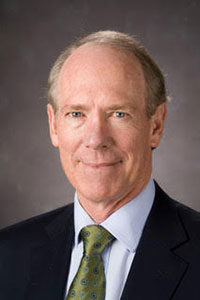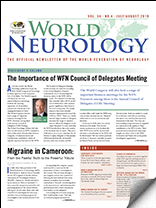As all who receive the World Neurology publication know, the XXIV World Congress of Neurology is almost upon us. It will commence Oct. 27 in Dubai. The World Congress will showcase the most topical subjects in neurology, facilitate the learning experience of all attendees, and provide a forum for wide-ranging discussion of these. The World Congress will also host a range of important business meetings for the WFN. Foremost among these is the Annual Council of Delegates (COD) Meeting. The Global Neurology Alliance will also meet as will numerous WFN committees such as Education, Membership, Finance, Congress, e-Communications and Constitutions, and Bylaws, which all together represent the heart of the WFN.

William Carroll, MD
The Council of Delegates Meeting is held annually, as it must be according to the United Kingdom Charities’ Commission. It is at this meeting that decisions critical to the WFN will be made. The Annual COD Meeting that coincides with a WCN, as this one in Dubai does, often assumes greater significance than those in the intervening years. The simple reason is that more national member representatives attend the COD in a WCN. There is no doubt that the larger number of delegates increases the range of opinions that are offered by delegates on the topics discussed. It is also clear that the WFN benefits from this in the quality of the decisions that are made. This year’s COD will occur at 2 p.m., Saturday, Oct. 26. Seventy to eighty delegates or their proxies will be present from the 120 member societies, observers, trustees, and the London Office staff. Under the WFN rules, only member societies that are “financial” will be able to vote on resolutions and elections.
At this year’s COD, there are critical decisions to be made. Two elected trustee positions are to be decided, the 2023 WCN venue will be resolved and elections to membership of the WFN will be determined. The two trustee positions are those of treasurer, currently occupied by Richard Stark, and an elected trustee (Steven Lewis). Both are entitled to stand for re-election, and both are exercising this option. You will find their personal statements in this issue. That they are both standing unopposed may be regarded as a testament to the quality of their contribution to the WFN to date. Their personal statements provide important insights into their views of the WFN, its function and future role as the global neurological organization.
The 2023 WCN will be held in the Americas. It will be hotly contested by the Mexican Academy of Neurology (Mexico City), the Canadian Neurological Foundation (Montreal), and the Brazilian Society of Neurology (Rio de Janiero). The decision is a crucial matter for the WFN as its signature biennial education event. The promotional summaries from each member society vying to host the WCN are also contained in this issue. During the COD, each contender will have 10 minutes to present their case and 5 minutes to answer questions from the delegates. Kenes, professional conference organizer (PCO) for the WFN, will then present a summary of the pros and cons for each venue, which will be then followed by the vote. While not binding on the WFN, the vote is usually accepted given the democratic principles upon which the WFN functions.
Respect for democratic principles is at the heart of a third matter to be subjected to a vote at the COD. It is on the matter of two neurological societies applying for membership of the WFN. The applications are from the Nepalese Society of Neurology and the Kosovo Neurological Society and will be presented at the Council of Delegates. The process to be followed is first a recommendation from the Membership Committee to the Trustees, which after approval by the trustees, then goes forward to the Council of Delegates to vote on the application.
As judged by the Membership Committee, the application from the Nepalese Society was straightforward. The application from the Kosovo Neurological Society presented some challenges. While the Kosovo Neurological Society is properly constituted and satisfied all the representative requirements, there was an important additional consideration. This was whether Kosovo should be regarded as a separate independent country. In order for this to be judged fairly, the Membership Committee sought the views of the trustees, and more widely, before making a decision.
Essential to these views was whether Kosovo had the right to apply, whether it was already represented by the Serbian Society of Neurology and whether it had access to membership elsewhere, or placed restrictions on who could be members of the Kosovo Neurological Society. These matters were considered in detail, and formal and informal opinions solicited from other interested parties. The Membership Committee deemed that Kosovo was a separate country according to the WFN Articles of Association, had satisfied all requirements for membership, and that in the interests of fairness for it to represent Kosovo neurologists in the WFN, its application should go forward to the COD where the final decision would be made.
An important consideration in this decision was that the EAN apparently had to decline the same application by the Kosovo Neurological Society because Kosovo did not comply with EAN Bylaws in not being a WHO “European” country. This view differed from that of the WFN. In our situation, a country is determined to be such by the trustees on behalf of the WFN.
I have taken this time to detail the path that this application has followed to illustrate that these decisions are carefully considered before proceeding to the vote. It is, in some respects, similar to the due consideration given to the membership of the Hong Kong Neurological Society when the Chinese Neurological Society became a member. As long as the reasons are transparent and do not interfere with the function of other member societies, I feel confident that the COD will make a fair decision.
As mentioned at the commencement of this report, the Global Neurology Alliance will also meet at 12:30 p.m. on Monday, Oct. 28. This is an important element of the WCN and for international neurology. By combining the views of the members of the GNA in the WCN program and providing a forum for the GNA, the WFN seeks to maintain a working relationship between all the GNA participants. As I have mentioned before, the Global Neurology Alliance is essentially a topic-based global organization that strongly complements the national and geographic global structure of the WFN. In so doing, it provides world neurology the flexibility, expertise, and credibility to address almost any global matter requiring the attention of neurologists.
Central to this meeting of the GNA are at least three matters of substance. The first is the issue raised at the GNA meeting in Lisbon during the 2018 EAN meeting on the need for the GNA to formulate its role in raising the awareness of brain health. The second is to report on the success of the 2019 World Brain Day and to deliberate on themes and partnerships for World Brain Day 2020 and beyond. The WFN has previously partnered with a major topic group like the World Stroke Organization and the International League Against Epilepsy and this year with the International Headache Society. Third, the GNA will be asked to contribute to the 2021 WCN in Rome and how best to incorporate activities and topics from the GNA members.
Finally, by the time this issue of World Neurology is on your device, the program will have been finalized on the World Congress of Neurology website. The WCN will provide daily highlights throughout the Congress, teaching courses, and cutting-edge topics delivered by expert lecturers. Notable among these are several plenary lectures such as “The Battle to Beat Parkinson’s Disease” by Patrick Brundin; “Sleep and Circadian Rhythm” by Russell Foster; “Gene Therapy and Neurodegenerative Diseases” delivered by Sarah Tabrizi; “Brain-Machine Interfaces” by Miguel Nicoleilis; and “The Promise of the Brain Initiative for Those With Neuro/Mental/Substance Abuse Disorders” by Walter Koroshetz.
Each day will feature main topic lectures on stroke, epilepsy, dementia, demyelinating diseases, movement disorders, neuromuscular diseases, and headache. Interspersed are numerous teaching course sessions, free paper sessions, and poster sessions—all providing a lively interactive environment. The Tournament of the Minds, featuring teams of four, will provide a wealth of clinical learning in a good-natured, competitive spirit. The program will be WCN Congress app-based and social media platforms and the internet will be accessible throughout the Congress including a twitter wall.
The 2019 WCN promises to be an outstanding event, and the WFN is most grateful to all those who have worked to make it so.
